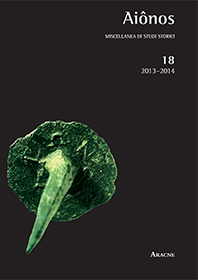Estratto da
AIôNOS
Miscellanea di Studi Storici (2013–2014)
Itinéraires croisés des enfants accusés de sorcellerie en République démocratique du Congo. Le cas de Lubumbashi (Katanga)
AIôNOS
Miscellanea di Studi Storici (2013–2014)
Itinéraires croisés des enfants accusés de sorcellerie en République démocratique du Congo. Le cas de Lubumbashi (Katanga)

In this article I consider the phenomenon of the “child–witches” (enfants–sorciers) in Lubumbashi (Katanga, DRC) as a result of the intertwinement of two socio–cultural dynamics: the structural violence of the families’ daily life within which the accusations of children occur, and the symbolic violence exerted upon the street children who are identified as witchlike individuals. In this vein witchcraft accusations are, on the one hand, the consequence of an increasing structural violence characterizing the children living conditions within the sphere of their family; on the other hand, the transgression of the social norms by the street children provokes in themind of the Lubumbashi’s dwellers the identification of these children with witchcraft. In this vein, I propose an ethnographic approach which takes into account the multiformfeatures of the “child–witches” phenomenon highlighting the importance of everyday practices, such as the payment of the school fees, and the witchcraft idiom as “pragmatics of uncertainty” that allow Congolese families to deal with uncertainties of life, such as sickness, suffering,marital problems, failure, and death.Key–words: anthropology, child–witches, structural violence, witchcraft, Katanga, Democratic Republic of Congo, everyday practices.
| pagine: | 107-131 |
| DOI: | 10.4399/97888548882586 |
| data pubblicazione: | Dicembre 2015 |
| editore: | Aracne |








